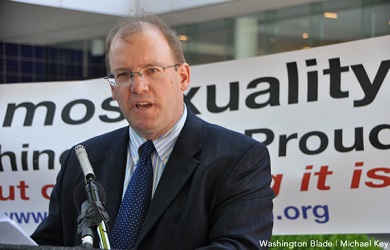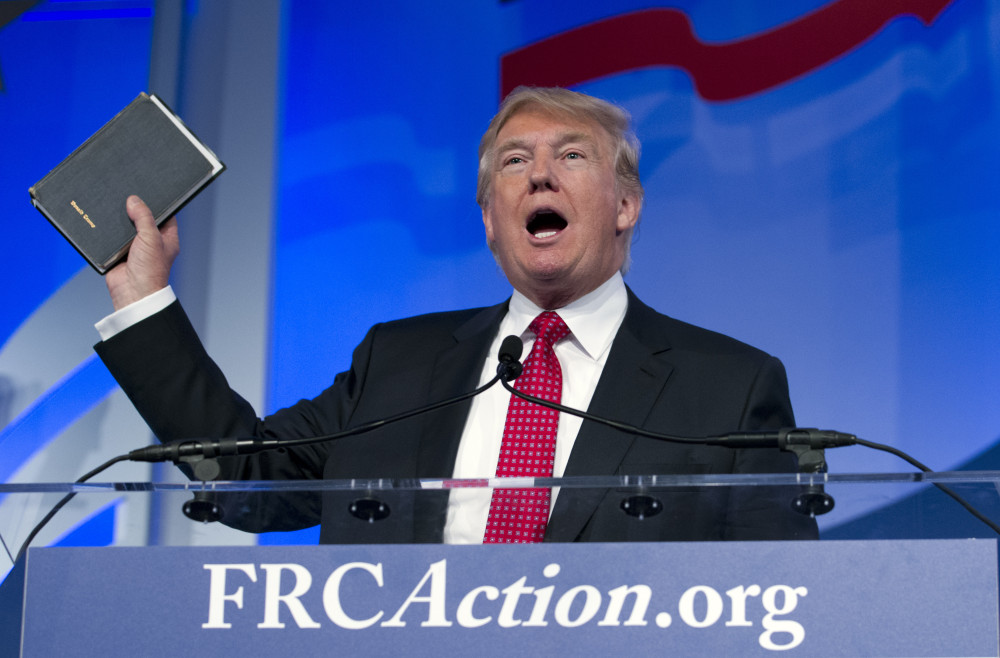At a panel at this weekend’s Values Voter Summit, activists representing the event’s organizer, the Family Research Council, and other conservative groups laid out what they will press Republican lawmakers to do in the first 100 days of the next presidency.
Under a Hillary Clinton administration, the conservative activists said, Republicans in the Senate should do as much as they can to obstruct her nominees to the judicial and executive branch. If Donald Trump is elected, they had a wish list of priorities for his administration, focusing on rolling back advances to LGBT and reproductive rights that have taken place during the Obama administration.
Mandi Ancalle, the FRC’s general counsel for government affairs, reminded the audience that FRC had helped to shape the Republican Party’s ultraconservative platform at the GOP convention in Cleveland and was hopeful that a Republican president—i.e. Trump—would help to make much of it law.
Ancalle said that the FRC is “working to generate a comprehensive list” for the Trump administration of executive orders, executive guidance and administrative regulations that a President Trump should rescind soon after taking office, and of Bush-era policies that he should reinstate. She said that the group was working with contacts on Trump’s transition team to get their wish list into the GOP nominee’s hands.
Among the priorities that she said FRC is pushing for in the first 100 days of a Trump administration:
- Rescind the Department of Housing and Urban Development’s guidance assuring that federally funded emergency shelters house transgender people according to the sex with which they identify.
- Reinstate the Mexico City Policy, which bars U.S. foreign aid from going to groups that provide abortion-related services or advocate for abortion rights abroad, even when those services are not paid for by U.S. government funding. This so-called “ global gag rule” was rescinded by President Obama.
- Reinstate a rule instituted by President George W. Bush that provided broad “conscience protections” for health care workers refusing to participate in care for religious reasons. According to the Washington Post, the rule “was widely interpreted as shielding workers who refuse to participate in a range of medical services, such as providing birth control pills, caring for gay men with AIDS and performing in-vitro fertilization for lesbians or single women.” In 2011, the Obama administration rescinded much of the Bush-era regulation but maintained conscience protections for health care providers who do not want to perform abortions. Ancalle noted that the FRC wants to make sure that new regulations allow physicians not to care for transgender patients by providing hormone therapy and other treatment.
- Reinstate Bush’s ban on federal funding going to embryonic stem cell research.
- Rescind President Obama’s executive order banning federal contractors from engaging in anti-LGBT discrimination.
Although Ancalle did not explicitly name them among FRC’s first-100-days priorities, she also criticized the Department of Education’s guidance on access for transgender students in public schools; the Department of Health and Human Services’ contraception mandate; the “completely lawless” Equal Employment Opportunity Commission guidance on access for transgender people in the workplace; and President Obama’s executive actions on immigration.
She also indicated that the FRC would urge a President Trump to undo the Obama administration’s work pushing LGBT and reproductive rights abroad, saying that the administration has “in some ways become a lobbying organization” and that “ambassadors that are appointed and sent overseas to represent American values have not only kind of flipped on their head what Americans stand for, what you and I stand for, but have really begun to lobby governments in attempting to accept same-sex marriage, in attempting to accept this gender identity dysphoria and attempting to push abortion acceptance and pro-abortion legislation in those different governments.”
She reminded the activists in the room that executive branch nominees—including nominees for ambassador—can be confirmed or blocked by the Senate, and urged the Senate to broadly exercise its power to block these nominees, whoever becomes president.
“It’s important that as we maintain a majority in the Senate that we’re encouraging our senators to not defer to what the president—honestly, whether it’s a Trump or a Hillary Clinton presidency—not to just defer to the president,” she said. “We’ve heard some senators say ‘elections have consequences’ and just put their stamp of approval on any secretary, on any nominee, and it’s really important that senators are out here in Washington, D.C., representing you all as you’re back at home, and representing your views on who those heads of these very authoritative departments and agencies are.”





.jpg)

